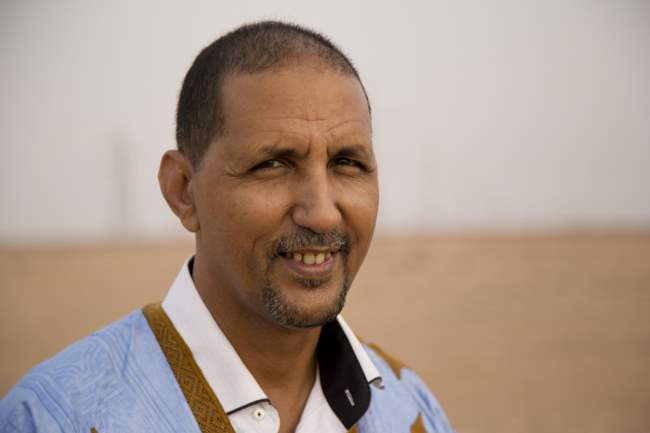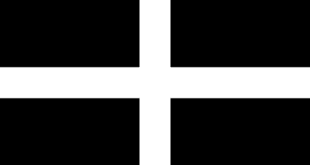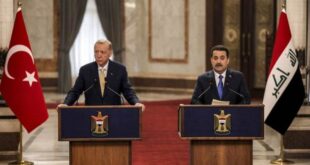On a bright Monday morning in the British Library in London, I met Brahim Dahane, the softly spoken Saharawi human rights defender. He spoke through a translator about freedom of movement, the Sahrawi leadership and the United Nations Mission for the Referendum in Western Sahara (MINURSO). Annual talks to renew the MINURSO mandate began on 17 April and this week members of the Security Council will vote on whether to include human rights monitoring in the peacekeeping mission, something that has been strangely absent to date.
Can you tell me about the campaign calling on the UN Security Council to extend the MINURSO mandate?
From when Morocco and Mauritania first occupied Western Sahara in 1975 until today, people are still suffering daily from torture and repression. We call on MINURSO to take its responsibilities seriously and to include the protection and monitoring of Sahrawi human rights. [Its mandate since 1991 has been to monitor a ceasefire between the Moroccan armed forces and Polisario, and to implement a referendum that would allow Saharawis self-determination; the latter has still not been achieved.] We are desperately in need of this monitoring. We announced the International Campaign for the inclusion of Human Rights in MINURSO’s Mandate in Western Sahara in January this year. Since then we have organized demonstrations every month on the 15th day of the month and have written many letters to the UN Secretary General. Our demands are fair and we are just asking for human rights for everyone. If the campaign is not successful, we will continue with our struggle.
Why did you become involved in human rights defence?
Former Secretary General of Amnesty International Pierre Sane asked the same question to a fellow human rights defender. His reply was this: ‘In Western Sahara we came into this field of human rights not from the door but from the window.’ The situation obliges you to be a human rights defender and activist, it is what life obliges you to do. In 1991, 320 of us were released from prison – we had experienced forced disappearance for 3 years – some for as long as 17 years. No-one knew where we were, whether we were dead or alive. When we were released, the Moroccan authorities wanted to humiliate us, wanted us to be an example for all Saharawi people. Everyday we had to go to the police station to sign and they encouraged the Moroccan settlers and Saharawi citizens not to give us jobs or to engage with us: this is something that made me want to change the situation.
You have visited Morocco to raise awareness of the occupation within civil society and among Moroccan human rights groups. Do you encounter restrictions entering the country?
It is possible but more difficult for former prisoners to go to Morocco. I have been asked where I will be going, who I am going to meet. Western Saharans have Moroccan ID and are considered Moroccan citizens but they are treated differently. I was arrested at an airport in Morocco on my way back from visiting Saharawi refugee camps in Algeria in October 2009 [and imprisoned until April 2011].
[Note: A 2,700-kilometre wall separates Saharawi people living in the refugee camps under Polisario control from those living under Moroccan occupation in Western Sahara. Many Saharawis have not seen family members on the other side of the wall for 40 years. Trenches, armed watchtowers and seven million landmines make the wall impenetrable.]Sahrawis have limited freedom of movement. How difficult is it to travel to other countries?
Getting a Moroccan passport was not easy; it took many years. After contacting some embassies in 1999 – US, British – they put pressure on the Moroccan authorities to grant me and other activists passports so that that we could travel. In 2003, 13 of us were on our way to Geneva for a human rights conference. The Moroccan authorities seized my passport and I didn’t get it again until 2007. You never know what’s going to happen to you. Sometimes going through checkpoints [in Western Sahara] and having discussions with the authorities and the police makes me lose my temper and I speak loudly but you have to persevere to gain your rights. For example, I have travelled here now.
There were intifadas (uprisings) in Western Sahara in 2000 and 2005. Are people still resisting today?
The uprisings are still going on because there are other ways to demonstrate. All of Western Sahara is involved, including the Polisario territory refugee camps. The reason we travelled to the camps in 2009 when we were arrested was to create a link on both sides of the wall between Saharawi human rights activists in the camps and the citizens of the occupied territories. Demonstrations were going on such as Gdeim Izik camp in 2010 when 20,000 Saharawis protested peacefully. It was a very democratic mode of expression. We went out of the city and set up camps to demonstrate for human rights and for economic and social rights. The intifada is still going on, sometimes there is a lack of resources, and sometimes we try to invent new ways to raise awareness.
The 23 Sahrawis detained after Gdeim Izik camp were handed heavy prison sentences (between 20 years and life imprisonment) at their trial last year. Are you hopeful that they will be pardoned?
We are aware that they didn’t commit a crime and they are in prison unfairly. One important thing is that all Saharawis are with them; we support them and believe that they are innocent. I know the difference between being supported by citizens and being isolated while in prison. We will not stop raising awareness about them until they are free.
Do people in Western Sahara feel that the exiled leaders of Polisario represent them?
Indeed, and this is something that we don’t only say here, we say it everywhere: Polisario is the legitimate representative of the Sahrawi people. The principle of Polisario is something that we made in our conscience and heart in order to achieve independence. Why are we linked with Polisario? Because we are in a boat in the middle of the Atlantic and the Pacific Ocean, we need something to represent us, to unite us – that boat to take us to a safe place. And after that we want to be a modern and democratic state, open and respectful for everyone. The Moroccans feel nervous when we tell them that Polisario is our representative and that we are all for the same cause. The UN and the EU recognizes Polisario and there are Polisario representatives and embassies in many countries [The Polisario government-in-exile represents Western Sahara as a member state of the African Union, from which Morocco has withdrawn in protest.]
Do you face repercussions after talking to journalists?
No-one forced me to do this kind of job. I’m not afraid, I have experience of 30 years of all kinds of torture. After I was released one time, I was in a coma for 33 days. Even if I die, I will rest then. I am convinced of what I am doing. Two weeks ago [in Western Sahara] I decided to take a little time to play some sport and I was doing it in an isolated place; it was quiet but it was dangerous. My friends told me not to do that again. But we are all going to die somehow. The thing is, I don’t want to live with fear any more. I want a normal life. It is better to die than to live afraid.
What are your hopes for the future?
I hope that our goals are achieved – that Western Sahara becomes independent. And I hope that the Saharawi people learn from the sufferings they have been submitted to all these years – that they live in peace and have respect between them and do not build a failed state. We hope that we gain independence and that you will come and visit us in our independent country.
Over to you – any final remarks?
Great Britain is the mother of democracies – it is a modern democracy, British citizens have suffered from wars and conflicts but they have moved on and now treat each other with respect. I hope that the British people could value this but also apply it to others now that they have influence, to try to help the Saharawi cause and achieve peace. I hope that trade unions will help to solve the problem in Western Sahara. All we are asking for is they stand with justice and human rights – that people stand on the side of justice.
Source: Newint.org
 Infowelat Enformasyon Ji Bo Welat
Infowelat Enformasyon Ji Bo Welat




